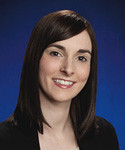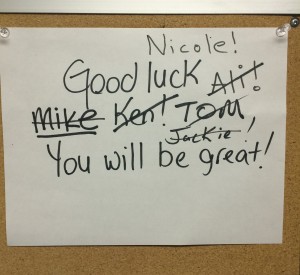July 17th, 2015
Good Luck! You Will Be Great!
Nicole Hugel, MD

Nicole Hugel, MD, is a 2015-16 Chief Medical Resident at University Hospital in London, Ontario, Canada
July 1st, the date of new beginnings in medical training. This is the day where we first get to use the title “Doctor,” start our first senior-level call, become subspecialty fellows, or finally reach the end of residency and formal clinical training. For me, July 1st marked the first day in my role as Chief Medical Resident (CMR). In my program, the CMR position is shared among six residents across two teaching hospitals. We have both teaching and administrative responsibilities, and, like most other CMR positions in Canada, we complete these alongside our regular clinical rotations.
Since discovering that I would get to be CMR this year, I have felt a mix of excitement and insecurity. I would go to sleep confident that I could excel in this position, then have nightmares that I would get in front of the whiteboard for a teaching session and completely forget everything I had prepared. As July 1st got closer, I got increasingly nervous.
Insecurity as I take on new clinical responsibilities is definitely not a new experience for me or for most other trainees and residents. As we progress through medical training, we are torn between feeling ready for more independence, and being worried we have not learned enough to complete more difficult medical assessments. These same feelings hit us with our first unstable patient, first time running a code, and first time on senior-level call. We are eager to make our own decisions and then second-guess every decision we make.
Part of this insecurity is a safety mechanism, and it helps motivate us to learn and make better clinical decisions. But, as residents, we need reassurance that our insecurity is normal. Mentorship is a huge part of building a career in medicine, but I find it especially important when moving toward additional clinical or administrative responsibility. Our mentors normalize our apprehension and build our confidence. They share their own successes and failures, and remind us that we are not alone in the challenges we face.
On June 30th, I was acutely aware of the big shoes I had to fill as CMR. The former CMRs have been wonderful teachers and mentors during my training. Exceptionally smart, they were an intimidating group of people. But as I walked into the CMR office for the first time, both excited to contribute to the program and nervous that I would not meet the standard they had set, the formers CMRs once again came through. I saw this simple sign posted in the office and was reminded that each of these individuals also had a first day as CMR. They each got through their first teaching session, call schedule conflict, and administrative challenge, and came out as leaders within our program.
Knowing I had the support of those who held the CMR position before me, I got through my first teaching sessions and now have several weeks of CMR behind me. I still have a lot to learn, but I already see an improvement in my teaching and clinical reasoning. I am ready for the new challenges this year will bring, and this simple sign makes me smile every day.
So, to everyone moving on to new roles this July, and facing the insecurity that comes with taking on more responsibility, I echo the statement of the CMRs before me, “Good luck! You will be great!”


